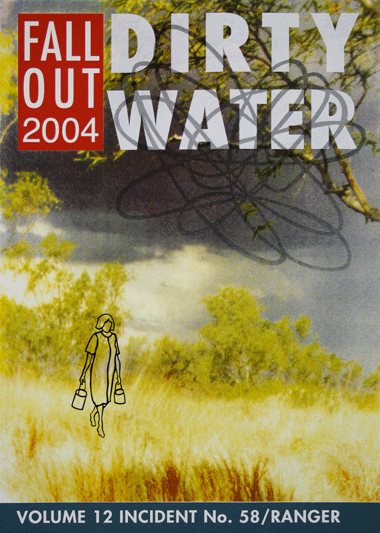ALISON ALDER
| Dirty Water | ||||||
 |
||||||
|
DIRTY WATER Alison Alder became well known for her political posters in the eighties and nineties. Alder still uses her preferred medium of screen-printing extensively, and makes work that explores social and political issues. Her work still packs a punch, but the way it draws you in and presents its message is less strident, more thoughtful. Dirty Water is an exploration of nuclear activity in Australia. It raises many questions, and powerfully associates them with a shared nostalgia. Nuclear matter has often been tested, mined and dumped on Aboriginal land – with devastating consequences – but it has affected many more Australians, including all of Adelaide when a radioactive cloud from British nuclear tests at Maralinga passed over [the city] in 1956. Six video projections are the main focus of Dirty Water, combining screen-printed backgrounds from old and new photographs with animations and nostalgic, at times, poignant, music. Alder prints the backgrounds many times, one for each still, allowing irregularities in colour and registration to occur. This makes the moving image flicker like an old film, and the prints are also reminiscent of vintage postcards, which often used a four-colour half-tone printing process. Over the top of this, a simple screen-printed animation moves across the image. In some of the video works, the transport of radioactive materials and nuclear waste through the Australian landscape and via bush highways is cheekily depicted. For instance, in Nuclear Highway, barrels of radioactive waste tumble carefree through a small town, past road signs and men mowing a grassy median strip. In other videos, Aboriginal women move through landscapes that have been irrevocably changed by colonisation, their presence highlighting how Indigenous people have been forced to change the way they interact with land that they have been living with harmoniously for thousands of years. Having lived in the outback and worked in Aboriginal communities, the political is personal for Alder, but she does not expect everyone to share her concerns. Either way, Dirty Water can be enjoyed as an exhibition of beautiful printed images, moving in both senses of the word. Annika Harding |
||||||
|
Fall Out 2004, Screen print on paper, 2010 |
||||||